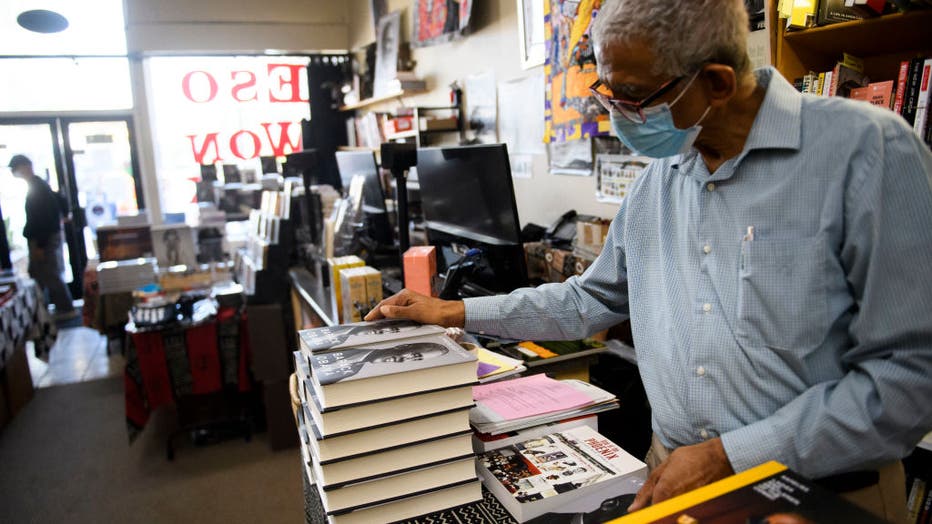Poll: One-third of African Americans say someone close to them has died of COVID-19
A recent poll conducted by the de Beaumont Foundation found that 1 in 3 African Americans know someone close to them who died of COVID-19, illustrating the disproportionate impact the novel coronavirus is having on communities of color in the United States.
The poll, which was released on Nov. 30, not only highlights the disparity between African Americans and their experiences with COVID-19 in their communities compared to the rest of the U.S., but how the rhetoric being used by local and federal officials is “missing the mark – and failing to motivate millions of Americans to get behind life-saving public health precautions,” according to the foundation.
The poll found that the language and politics surrounding how the public views the pandemic is important when it comes to convincing people of the best practices to slow the spread of the virus.
As cases of COVID-19 continue to rise rapidly throughout the United States and hospitals are reaching capacity, non-partisan policy when it comes to handling the ongoing pandemic is more important than ever, according to the de Beaumont Foundation.
“We don’t have a partisan divide — it’s a chasm,” said Dr. Frank Luntz, who conducted the poll Nov. 21-22. “The words our leaders are using need an immediate upgrade. What they’re saying isn’t working. Democrats and Republicans simply think differently and act differently. We need to accept this as fact.”

FILE - Small black-owned businesses suffers amid the latest surge in coronavirus cases in Leimert Park neighborhood of Los Angeles, California, Nov. 24, 2020.
RELATED: Survey: Widespread decline in social distancing preceded COVID-19 surge in US
“Based on our findings, our leaders need to remove politics and partisanship from their messaging and give Americans a better reason to comply other than because it’s good for them. They must remind people that it’s also good for the people they love and will speed up the return to a strong economy and a normal life,” Luntz added.
Polling data revealed that 10% of respondents said they would not take a COVID-19 vaccine.
“Only 4% of African Americans said they would take the vaccine ‘without hesitation,’ compared with 16% of the national total, 15% of Democrats, and 16% of Republicans,” according to the foundation.
“While Americans agree that the COVID pandemic is getting worse, there is a chasm between Democrats and Republicans about how serious the situation is, with 62% of Democrats saying the current situation with COVID is ‘extremely serious,’ compared with only 33% of Republicans feeling the same way. In total, 74% of respondents said the situation is ‘very serious’ or ‘extremely serious,’ while for African Americans that number was 86%,” the polling data showed.
When asked whether they knew someone who died of COVID-19, 23% of total respondents said someone close to them had died of the novel coronavirus. Thirty percent were Democrats and 18% were Republicans, but even higher was the number of African Americans who said they knew someone who had died because of COVID-19 at 34%, according to the foundation.
During a House Energy and Commerce Committee hearing in June, Dr. Anthony Fauci, director of the National Institute of Allergy and Infectious Diseases, said that institutional racism is a contributing factor to why Black communities have suffered disproportionately during the coronavirus pandemic compared to White communities.
“Obviously the African American community has suffered from racism for a very, very long period of time,” Fauci said. “And I cannot imagine that that has not contributed to the conditions that they find themselves in, economically and otherwise.”
RELATED: Data suggests coronavirus disproportionately impacts black, Latino communities
“Because of economic and other considerations, the jobs that the majority of them would find themselves in does not allow them to protect themselves by looking into a computer and doing telework,” Fauci continued.
“And then we know, from a lot of experience now, that the situation regarding whether or not you have serious consequences – hospitalizations, intubation, complications, and death – relate very strongly to the prevalence and incidence of underlying co-morbid conditions which are clearly disproportionately more expressed in the African-American population than in the rest of the population, and that particularly includes hypertension, diabetes, obesity, chronic lung disease, and kidney disease,” Fauci continued.
“So unfortunately we have a situation where it’s sort of a double whammy of a negative capability of them to respond through no fault of their own, because of underlying conditions,” Fauci said.
It was also revealed that of the 800 people surveyed by the de Beaumont Foundation, 74% said the coronavirus pandemic is “very serious” or “extremely serious.”
But when broken down, Democrats made up the majority of that group at 62%, with Republicans at 33%. When asked about how best to prevent the spread of the novel coronavirus, a majority of respondents believed wearing a mask was the most “sensible and responsible and impactful.”
“Respondents of all parties (59%) chose ‘wearing a face mask in public,’ more than any other approach,“ according to the poll.
Interestingly, the words used when referring to COVID-19 by public officials also had an impact on how the public views the ongoing pandemic.
For instance, “49% of Americans consider a ‘pandemic’ more ‘significant, serious and scary’ than ‘COVID-19’ (39%) or ‘the coronavirus’ (13%).”
RELATED: COVID-19 pandemic has an alarming impact on minority communities
The same went for words such as “lockdown,” which respondents said elicited more negative feelings as opposed to “stay-at-home order.”
“Effective communication is always important in public health, but it’s never been more important for health leaders to understand the perceptions of Americans and modify their language accordingly,” said Dr. Brian C. Castrucci, president and CEO of the de Beaumont Foundation.
FOX News contributed to this report.

